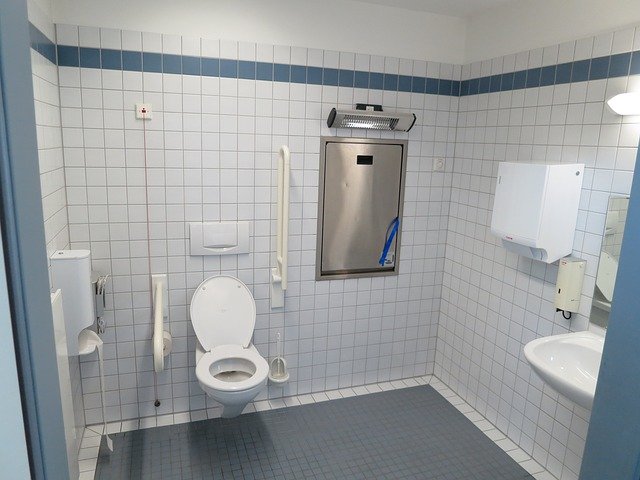Premier Inn Apologises to Paralympic Swimmer After Lift Outage
Paralympian Ellie Challis and her father were unable to access their Premier Inn hotel room due to a broken lift. As reported by the BBC, Ellie Challis, a Paralympic...
Read Full Article
A major change to building rules in England will require thousands of large (12m2) and accessible toilet facilities to be designed and built into new public buildings, from 2021.
Changing Places toilets are larger accessible toilets for severely disabled people, with equipment such as hoists, curtains, adult-sized changing benches and space for carers.
More than 250,000 severely disabled people will have greater access to public places after the government has moved to make Changing Places toilets compulsory in new buildings. It’s estimated that the new larger toilet spaces will be added to more than 150 new buildings a year. A £30 million fund to install Changing Places in existing buildings will open in the next few months.
As lockdown measures ease, it is hoped that this change will help people with disabilities gain easier access to places like shopping centres, supermarkets, cinemas, stadia and arts venues. These types of buildings will be required to include at least one Changing Places toilet.
“This is huge news for the quarter of a million people in the UK who need Changing Places toilets. Having access to these much-needed facilities increases independence and improves quality of life."
–Rob Burley
Director of Campaigns, Care and Support, Muscular Dystrophy UK
Places of assembly, recreation and entertainment with a capacity for 350 or more people will be required to install the facilities if they are newly built or have a major refurbishment.
This includes art galleries, cinemas, concert halls, conference centres, further education colleges, universities, hotels that include leisure facilities, libraries, motorway services, museums, places of worship, and theatres.
Shopping centres or retail parks with gross floor areas of 30,000m2 or more, retail premises of 2,500m2 or more, sport or leisure buildings over 5,000m2, and stadia, theme parks, zoos, or exhibition centres with a capacity above 2,000 people will also be included in the rules.
Approximately 250,000 people (and their carers and families) with profound and multiple learning disabilities will benefit, as well as people with other physical disabilities such as spinal injuries, muscular dystrophy and multiple sclerosis. Without these facilities in public buildings for changing adults and larger children, these people, their carers and families are largely permanently housebound.
Minister for Care, Helen Whately commented: “Dignity and independence is something many of us take for granted but can be a daily challenge for people with severe disabilities, especially when there is a lack of access to adequate toilet and changing facilities. All public spaces should cater for people with disabilities so they don’t have to suffer discomfort, embarrassment, or even injury without access to a Changing Place.
“Compulsory Changing Places in new public buildings is a major step in reducing the health inequalities faced by so many and will mean that future generations can live with independence, without having to worry about something as simple as basic amenities.”
Rob Burley, Director of Campaigns, Care and Support at Muscular Dystrophy UK, added: “This is huge news for the quarter of a million people in the UK who need Changing Places toilets. Having access to these much-needed facilities increases independence and improves quality of life.
“This legislation will make it easier for disabled people and their families to enjoy activities that many take for granted, whether that’s a day’s shopping or attending a concert.
Picture: A photograph of an accessible toilet
Article written by Ella Tansley | Published 21 July 2020
Paralympian Ellie Challis and her father were unable to access their Premier Inn hotel room due to a broken lift. As reported by the BBC, Ellie Challis, a Paralympic...
Read Full ArticleJuly marks Disability Pride Month, an international event that shines a light on physical, learning, hidden disabilities and mental health conditions, enabling open...
Read Full ArticleOn The UN International Day of People with Disabilities, how can FMs use their influence to promote the rights and wellbeing of persons with disabilities? More than...
Read Full ArticleImagine if you could only access 2% of the internet. Persons with disabilities are living in that world, and businesses should continue innovating to create truly...
Read Full ArticleThisWeekinFM, together with Clarion.Golf, got back to their annual golfing event after a year hiatus during the pandemic. The event raised £3.5K for...
Read Full ArticleSodexo has had its leader status in the UK Government's Disability Confident scheme re-accredited for a further three years. The Disability Confident scheme...
Read Full ArticleBoris Johnson has launched a new National Disability Strategy, including plans to consult on disability workforce reporting for businesses with more than 250...
Read Full ArticleThe British Toilet Association has called for improved legislation and more government funding to address the current "appalling" lack of public toilet...
Read Full ArticleHow is the erosion of the traditional high street impacting access and inclusion in our cities? Whilst much is being written about how socially distanced,...
Read Full ArticleA call for evidence by the government to review the provision of toilets in public places for men and women has begun, prompting concerns from transgender support...
Read Full Article